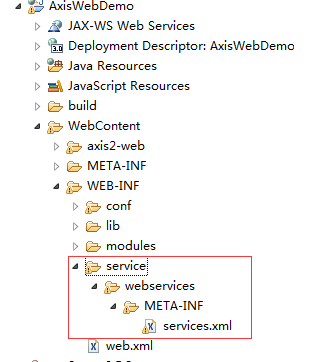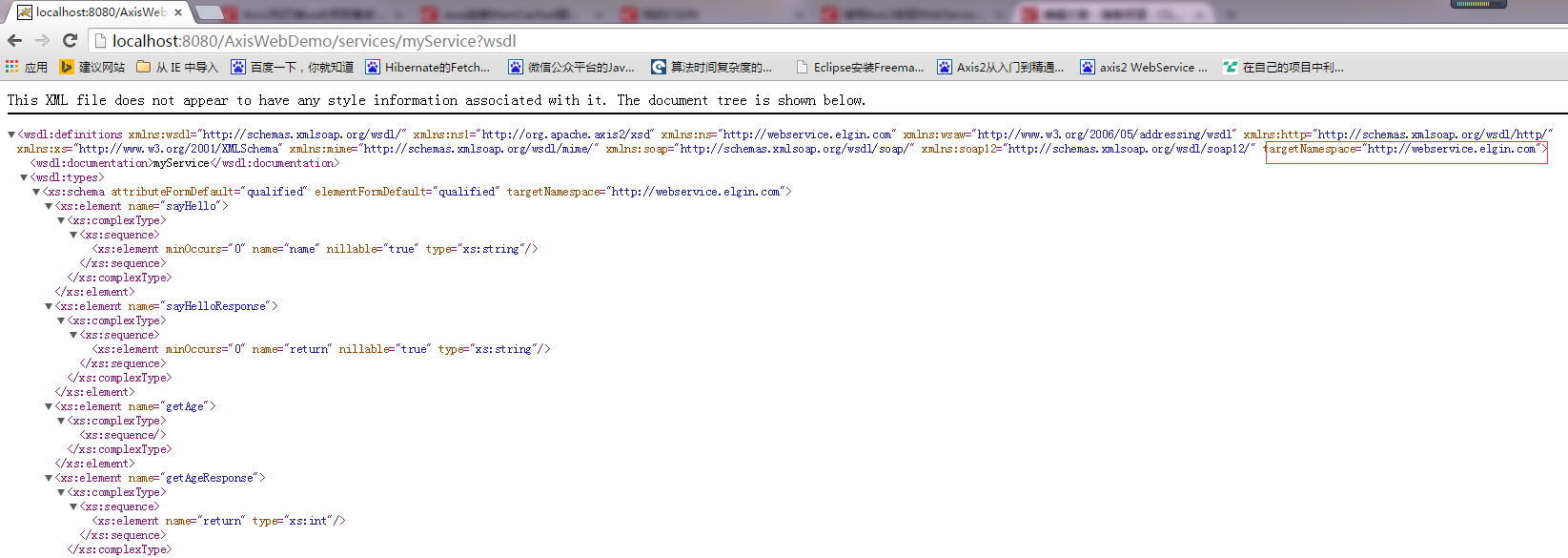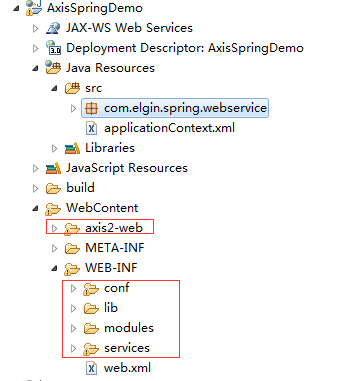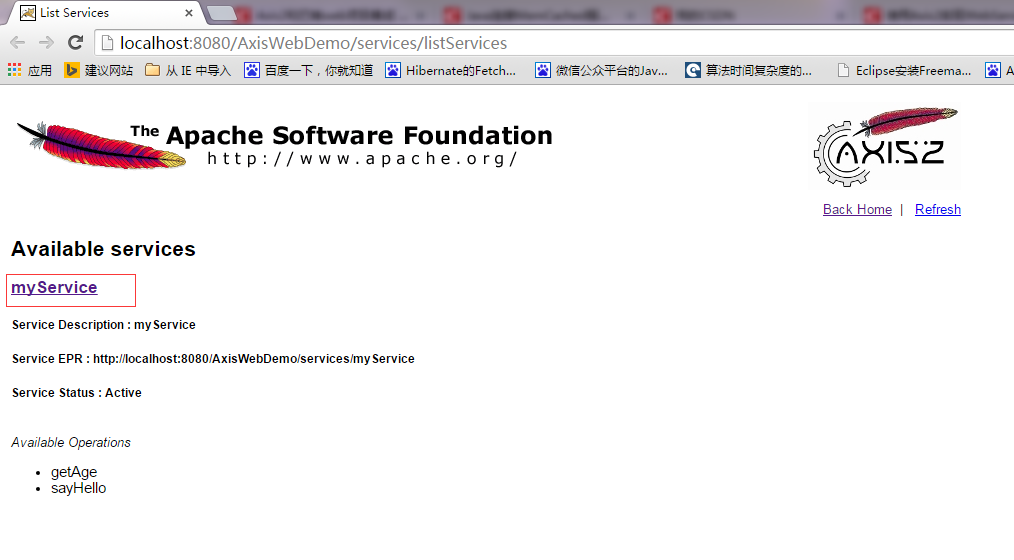Axis2简介:
Axis2是一套崭新的WebService引擎,该版本是对Axis1.x重新设计的产物。Axis2不仅支持SOAP1.1和SOAP1.2,还集成了非常流行的REST WebService,同时还支持spring、JSON等技术。
Axis下载地址: http://ws.apache.org/axis2/
Axis2与Web项目整合
一、说明:
《使用Axis2实现WebService的发布和调用》介绍了通过使用Axis2来发布和调用WebService,但是是把WebService发布在Axis2提供的项目中,如果我们需要在自己的Web项目中来使用Axis2发布WebService该怎么做呢?
本篇即介绍在Web项目中使用Axis2来发布WebService.
二、具体操作:
① 新建一个动态的web工程 (Dynamic Web project)
本例中新建的工程名为:AxisWebDemo
② 将上次下载的 axis2-1.6.4-war.zip 文件解压到相应的目录,将目录中的axis2.war文件放到Tomcat服务器的webapps目录中(本文使用的Tomcat的版本是7.x),并启动Tomcat。 这时在Tomcat的webapps文件夹中会出现一个 名为 axis2 的文件夹(其实这就是部署好的 axis2工程),如下图

③ 将 axis2 下的 axis2-web 文件夹移动到我们 AxisWebDemo 工程的 WebContent目录下
将WEB-INF 下的 lib 、conf 、modules文件夹移动到 AxisWebDemo工程的 WEB-INF目录下 ,结构如下图:

④ 在src右键,新建package : com.elgin.webservice
在这个包中新建一个我们需要发布的 WebService 服务的类: WebServiceDemo
代码如下:
package com.elgin.webservice; public class WebServiceDemo { public String sayHello(String name){ return "hello " + name; } public int getAge(){ return 26; } } ⑤ 在 AxisWebDemo 工程的 WEB-INF 下新建如下层次结构目录 : services/webservices/META-INF/services.xml ,如下图所示:

经过我的验证,发现:目录层次必须是 services / 任意名称文件夹 / META-INF / services.xml ,否则 WebService发布会失败 ,也就是说上图的层次中 ,只有webservice这个文件夹的名字是可以自由指定,其它的文件、文件夹名字都是固定的!
services.xml 配置文件内容:
<?xml version="1.0" encoding="UTF-8"?> <serviceGroup> <!- name属性配置WebService的名称 -> <service name="myService"> <description>Web Service</description> <!-- ServiceClass属性配置提供WebService服务类的全类名 --> <parameter name="ServiceClass">com.elgin.webservice.WebServiceDemo</parameter> <messageReceivers> <messageReceiver mep="http://www.w3.org/2004/08/wsdl/in-out" class="org.apache.axis2.rpc.receivers.RPCMessageReceiver" /> <messageReceiver mep="http://www.w3.org/2004/08/wsdl/in-only" class="org.apache.axis2.rpc.receivers.RPCInOnlyMessageReceiver" /> </messageReceivers> </service> </serviceGroup> ⑥ 在 AxisWebDemo 工程的 web.xml 文件中加入axis2的配置支持:
<!-- 加入axis2支持 --> <servlet> <servlet-name>AxisServlet</servlet-name> <servlet-class>org.apache.axis2.transport.http.AxisServlet</servlet-class> <load-on-startup>1</load-on-startup> </servlet> <servlet-mapping> <servlet-name>AxisServlet</servlet-name> <url-pattern>/services/*</url-pattern> </servlet-mapping> 经过以上6个步骤 , axis2 已经整合到工程中了 ,把项目加入的Tomcat中,启动Tomcat服务器 ,在浏览器中输入以下URL:
http://localhost:8080/AxisWebDemo/services/listServices
如果出现下图所示的信息,说明你的 WebService服务发布成功了:
上图中的 myService 即是你在 services.xml 中配置的 WebService的名称
输入下面URL:
http://localhost:8080/AxisWebDemo/services/myService?wsdl
出现下图所显示的关于服务的xml信息:

注意上图中 <wsdl:definitions> 元素中的 targetNamespace的值 ,上一篇介绍中也提到过 ,是提供WebService服务的类所在的包名倒过来。
三、调用上面工程中发布的WebService服务:
Java调用代码:
package com.elgin.webservice.axis2; import java.io.File; import java.io.FileInputStream; import java.io.IOException; import javax.xml.namespace.QName; import org.apache.axis2.AxisFault; import org.apache.axis2.addressing.EndpointReference; import org.apache.axis2.client.Options; import org.apache.axis2.rpc.client.RPCServiceClient; public class RPCClient { public static String address2="http://localhost:8080/AxisWebDemo/services/myService?wsdl"; public static void main(String[] args) throws IOException{ testWebDemo(); } @SuppressWarnings("rawtypes") public static Object[] invoke(String method,Object[] params,Class[] classes) throws AxisFault{ //使用RPC方式调用WebService RPCServiceClient client=new RPCServiceClient(); Options option=client.getOptions(); //指定调用的URL EndpointReference reference=new EndpointReference(address2); option.setTo(reference); /* * 设置要调用的方法 * http://ws.apache.org/axis2 为默认的(无package的情况)命名空间, * 如果有包名,则为 http://axis2.webservice.elgin.com ,包名倒过来即可 * method为方法名称 * */ QName qname=new QName("http://webservice.elgin.com", method); //调用远程方法,并指定方法参数以及返回值类型 Object[] result=client.invokeBlocking(qname,params,classes); return result; } public static void testWebDemo() throws AxisFault{ Object[] result=invoke("sayHello", new Object[]{"elgin"}, new Class[]{String.class}); System.out.println(result[0]); result=invoke("getAge", new Object[]{}, new Class[]{int.class}); System.out.println(result[0]); } } 运行结果:

原文地址:Axis2与Web项目整合
Axis2在Web项目中整合Spring
在现今的Web应用中经常使用spring框架来装载JavaBean。如果要想将某些在Spring中装配的JavaBean发布成WebService,本篇将做到介绍
一、说明:
上一篇说了Axis2与Web项目的整合过程,如果说在Web项目中使用了spring框架,那么又改如何进行Axis2相关的配置操作呢?
二、Axis2 与 Spring 整合
① 新建项目 AxisSpringDemo,并在其中加入 Axis2 与 Spring 相关的 jar 包
Spring所需 Jar :
aopalliance-1.0.jar aspectjrt.jar aspectjweaver.jar spring-aop-3.2.1.RELEASE.jar spring-beans-3.2.1.RELEASE.jar spring-context-3.2.1.RELEASE.jar spring-core-3.2.1.RELEASE.jar spring-expression-3.2.1.RELEASE.jar spring-tx-3.2.1.RELEASE.jar spring-web-3.2.1.RELEASE.jar
activation-1.1.jar axiom-api-1.2.15.jar axiom-impl-1.2.15.jar axis2-adb-1.6.4.jar axis2-jaxws-1.6.4.jar axis2-kernel-1.6.4.jar axis2-spring-1.6.4.jar axis2-transport-http-1.6.4.jar axis2-transport-local-1.6.4.jar axis2-xmlbeans-1.6.4.jar commons-fileupload-1.3.1.jar commons-httpclient-3.1.jar commons-io-2.1.jar commons-logging-1.1.1.jar geronimo-stax-api_1.0_spec-1.0.1.jar httpcore-4.0.jar jsr311-api-1.1.1.jar mail-1.4.jar neethi-3.0.2.jar woden-api-1.0M9.jar wsdl4j-1.6.2.jar xml-resolver-1.2.jar XmlSchema-1.4.7.jar
<!-- 加入Spring支持 --> <context-param> <param-name>contextConfigLocation</param-name> <param-value>classpath:applicationContext.xml</param-value> </context-param> <listener> <listener-class>org.springframework.web.context.ContextLoaderListener</listener-class> </listener> <!--加入Axis2支持 --> <servlet> <servlet-name>AxisServlet</servlet-name> <servlet-class>org.apache.axis2.transport.http.AxisServlet</servlet-class> <load-on-startup>1</load-on-startup> </servlet> <servlet-mapping> <servlet-name>AxisServlet</servlet-name> <url-pattern>/services/*</url-pattern> </servlet-mapping> 
④ 在src下新建包 com.elgin.spring.webservice ,并新建提供WebService服务的类 SpringWebServiceDemo ,代码如下:
package com.elgin.spring.webservice; import java.util.Random; import org.springframework.stereotype.Component; @Component("springWebService") public class SpringWebServiceDemo { public String springHello(){ return "hello spring-axis2"; } public int getAge(){ return new Random().nextInt(80); } public void update(){ System.out.println("update something.."); } } ⑤ 在类路径下新建 Spring配置文件 :applicationContxt.xml 配置文件
<?xml version="1.0" encoding="UTF-8"?> <beans xmlns="http://www.springframework.org/schema/beans" xmlns:xsi="http://www.w3.org/2001/XMLSchema-instance" xmlns:aop="http://www.springframework.org/schema/aop" xmlns:context="http://www.springframework.org/schema/context" xmlns:tx="http://www.springframework.org/schema/tx" xsi:schemaLocation="http://www.springframework.org/schema/beans http://www.springframework.org/schema/beans/spring-beans-3.2.xsd http://www.springframework.org/schema/aop http://www.springframework.org/schema/aop/spring-aop-3.2.xsd http://www.springframework.org/schema/context http://www.springframework.org/schema/context/spring-context-3.2.xsd http://www.springframework.org/schema/tx http://www.springframework.org/schema/tx/spring-tx-3.2.xsd"> <!-- 配置spring注解扫描的包 --> <context:component-scan base-package="com.elgin"></context:component-scan> <!-- 或者不用注解的形式加载bean,改用配置的方式 <bean id="springWebService" class="com.elgin.spring.webservice.SpringWebServiceDemo "> 利用property可以对SpringService类进行初始化,比如<property name="name" value="姚明" /><property name="job" value="职业男篮" />,在配置完SpringService类后,就可以直接在程序中FileSystemXmlApplicationContext类或其他类似功能的类读取applicationContext.xml文件中的内容,并获得SpringService类的对象实例。但现在我们并不这样做,而是将SpringService类发布成WebService。在Tomcat的webapps项目中的WEB-INF\lib目录中有一个axis2-spring-1.4.1.jar文件, 该文件用于将被装配JavaBean的发布成WebService。 --> </beans> ⑥ 配置 Axis2的WebService服务:
同上一篇所说:在 AxisWebDemo 工程的 WEB-INF 下新建如下层次结构目录 : services/springServices/META-INF/services.xml
services.xml配置内容:
<?xml version="1.0" encoding="UTF-8"?> <serviceGroup> <service name="springService"> <description>Web Service</description> <!-- SpringBeanName作用类似于普通配置中的ServiceClass,都是用来创建服务类对象,只不过普通配置使用反射来创建 加入Spring之后,对象的创建交给了Spring的IOC容器,SpringBeanName指定要发布成WebService的Java类在applicationContext.xml文件中装配,SpringBeanName参数是JavaBean的名称。SpringBeanName固定的不能改 ,因为springWebService是spring中注册的实现类得id 如果不使用spring,可以使用ServiceClass属性,ServiceClass参数要指定要发布成WebService的Java类,并指定全类名的方式:com.elgin.spring.webservice.SpringWebServiceDemo --> <parameter name="SpringBeanName">springWebService</parameter> <!-- 通过ServiceObjectSupplier参数指定SpringServletContextObjectSupplier类来获得Spring的ApplicationContext对象 --> <parameter name="ServiceObjectSupplier">org.apache.axis2.extensions.spring.receivers.SpringServletContextObjectSupplier</parameter> <!-- 在这里最值得注意的是<messageReceivers>元素,该元素用于设置处理WebService方法的处理器。 例如,getAge方法有一个返回值,因此,需要使用可处理输入输出的RPCMessageReceiver类, 而update方法没有返回值,因此,需要使用只能处理输入的RPCInOnlyMessageReceiver类。 --> <messageReceivers> <messageReceiver mep="http://www.w3.org/2004/08/wsdl/in-out" class="org.apache.axis2.rpc.receivers.RPCMessageReceiver" /> <messageReceiver mep="http://www.w3.org/2004/08/wsdl/in-only" class="org.apache.axis2.rpc.receivers.RPCInOnlyMessageReceiver" /> </messageReceivers> </service> </serviceGroup> <?xml version="1.0" encoding="UTF-8"?> <web-app version="2.5" xmlns="http://java.sun.com/xml/ns/javaee" xmlns:xsi="http://www.w3.org/2001/XMLSchema-instance" xsi:schemaLocation="http://java.sun.com/xml/ns/javaee http://java.sun.com/xml/ns/javaee/web-app_2_5.xsd"> <servlet> <servlet-name>AxisServlet</servlet-name> //注册axis2的servlet <servlet-class>org.apache.axis2.transport.http.AxisServlet</servlet-class> <load-on-startup>1</load-on-startup> </servlet> <servlet-mapping> <servlet-name>AxisServlet</servlet-name> <url-pattern>/services/*</url-pattern> </servlet-mapping> //加载spring的配置文件 <context-param> <param-name>contextConfigLocation</param-name> <param-value>classpath*:applicationContext.xml</param-value> </context-param> //增加spring监听器 <listener> <listener-class>org.springframework.web.context.ContextLoaderListener</listener-class> </listener> 测试总结:
经过上述的步骤,配置结束,将项目装载的 Tomcat ,启动 ,浏览器输入:http://localhost:8080/AxisSpringDemo/services/listServices 出现如下界面说明我们的服务已经发布成功了
访问
http://localhost:8080/WebService/services/springService?wsdl
可以查看wsdl (springService为service.xml中service的name)
通过上面的测试可以发现:
加入Spring之后,除了spring的引入以及配置,唯一不同的地方就是 services.xml 的配置发生了变化
原文地址: Axis2在Web项目中整合Spring
参考文档 : WebService之Axis2系列教程(八)Axis2与Spring集成发布
WebService之Axis2快速入门(7): Spring与axis整合发布为WebService

